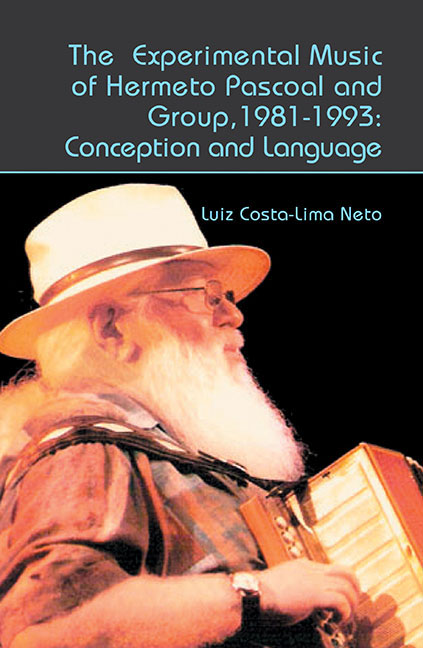Book contents
- Frontmatter
- Contents
- Miscellaneous Frontmatter
- Acknowledgments
- Introduction
- List of Illustrations
- Chapter 1 The conception and language of Hermeto Pascoal: first considerations
- Chapter 2 Bibliographic Discussion
- Chapter 3 The Creative Process Of Hermeto And Group
- Chapter 4 Reflections on Acoustics and Psycho-Acoustics
- Chapter 5 Selected Compositions For Analysis
- Conclusion
- Postscript
- Sources
- Plate section
Chapter 2 - Bibliographic Discussion
- Frontmatter
- Contents
- Miscellaneous Frontmatter
- Acknowledgments
- Introduction
- List of Illustrations
- Chapter 1 The conception and language of Hermeto Pascoal: first considerations
- Chapter 2 Bibliographic Discussion
- Chapter 3 The Creative Process Of Hermeto And Group
- Chapter 4 Reflections on Acoustics and Psycho-Acoustics
- Chapter 5 Selected Compositions For Analysis
- Conclusion
- Postscript
- Sources
- Plate section
Summary
Academic papers about Hermeto Pascoal are rare, and it can be said that his extensive works have as yet gone unexplored by musicology. In contrast, the number of articles, news items and reports about Hermeto in the Brazilian and international press is considerable. Nevertheless, there is a growing interest in Hermeto in academic circles, as attested by some master's degree theses. I shall now discuss this academic production, as well as examine newspapers and magazines that present excerpts from several interviews given by the composer.
From an erudite view point
In his master's degree thesis, Música de Invenção (“Music of Invention”) defended at UNIRIO in 1998, Tato Taborda analyzes the production of some Brazilian musical artists, in order to illustrate his hypothesis relative to the formation of a hybrid territory (the territory Taborda calls music of invention), established mainly by the contact between the erudite and the popular universes.
Taborda relates some aspects of the conception and language of Hermeto Pascoal to Luigi Russolo's futuristic noisism and to Pierre Schaeffer's concrete music. The researcher points out several features that Hermeto and Schaeffer have in common: the research about several everyday acoustic objects, the acceptance of new sounds, the attraction to noises, etc.
The comparison that Taborda draws between Hermeto and Schaeffer effectively underscores some features of Hermeto's conception.
An important similarity between Schaeffer's “Musique Concrète” and Hermeto, which was aptly observed by Taborda, is the rejection of synthesized sound. In fact, during the period on which this book is based (1981-1993), Hermeto restricted the use of electricity in his band to the piano and the bass. A sampler with pre-recorded sounds of pigs, hens, dogs, and other animals was tested by Hermeto, but without much success.
I am trying out the instrument (the sampler), but it isn't measuring up. It only works as a recorder of animal sounds, I've already recorded the goat, the sheep, the bull. But, when it comes to recording a higher sound, the sampler reproduces that horrible synthesizer sound, that doesn't synthesize anything at all. (…) I don't call it a sampler, I call it a keyboard recorder. I've even used the keyboard recorder in some tracks on the record I'm making, but I don't mention it in the credits because it doesn't do anything, it just records the sound.
- Type
- Chapter
- Information
- The Experimental Music of Hermeto Pascoal and Group, 1981–1993Conception and Language, pp. 13 - 26Publisher: Boydell & BrewerPrint publication year: 2015



